
AI In Mental Health Market Size, Share & Trends Analysis Report By Offering (Software, Services), By Technology (ML, NLP), By Disorder, By Region, And Segment Forecasts, 2024 - 2030
- Report ID: GVR-4-68040-327-3
- Number of Report Pages: 125
- Format: PDF
- Historical Range: 2018 - 2023
- Forecast Period: 2024 - 2030
- Industry: Healthcare
AI In Mental Health Market Size & Trends
The global AI in mental health market size was estimated at USD 1.13 billion in 2023 and is estimated to grow at a CAGR of 24.10% from 2024 to 2030. The market is being driven by factors such as the increasing prevalence of mental disorders and heightened awareness regarding mental health as a significant health concern. According to a June 2022 World Health Organization (WHO) report, approximately 970 million people worldwide were living with a mental disorder in 2019, with depression and anxiety being the most prevalent. These organizations are taking several steps toward implementing and promoting AI technologies in mental health. For instance, in April 2024, WHO launched S.A.R.A.H., a groundbreaking digital health promoter prototype. Powered by advanced generative AI, S.A.R.A.H. features an enhanced empathetic response capability. Utilizing new language models and cutting-edge technology, it provides 24/7 engagement on various health topics, accessible in 8 languages and available on any device.
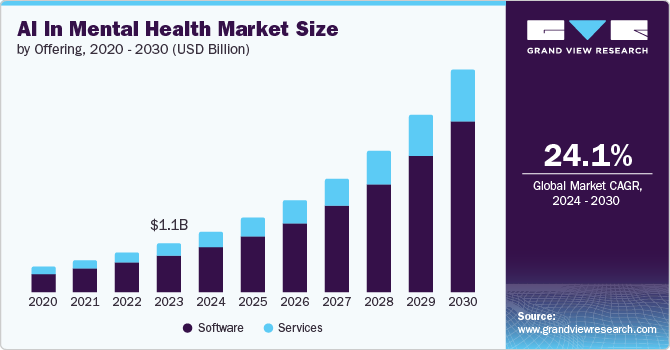
Governments globally are increasingly acknowledging the significant role of AI in advancing mental healthcare and are allocating funding to bolster research and development in this field. For instance, according to an article by the National Institutes of Health (NIH) published on June 2023, the National Institute of Mental Health (NIMH), a division of the US National Institutes of Health, has allocated funds for over 400 grants dedicated to research into advanced technologies such as AI and machine learning applications for mental health. Moreover, the growth of telehealth services has highlighted the need for remote mental health screening tools that can be seamlessly integrated into virtual care delivery systems.
Technological advancements in AI, including machine learning (ML) and natural language processing (NLP), have enabled the development of sophisticated tools that can diagnose, monitor, and treat mental health conditions with greater accuracy and personalization. Increased investment from venture capitalists and private equity firms has provided the funding for startups and established companies to innovate and expand their Offering. In addition, the growing acceptance of digital health solutions by healthcare providers and patients has facilitated the integration of AI technologies into everyday mental healthcare practices. These drivers collectively propel AI in the mental health market toward greater innovation, efficiency, and effectiveness in delivering accessible, personalized care.
The COVID-19 pandemic had a positive impact on the market. According to the WHO, March 2022 insights highlighted that during the first year of the COVID-19 pandemic, the global incidence of anxiety and depression surged by 25%. The pandemic has significantly affected young people's mental health, putting them at higher risk for suicidal and self-harming behaviors. The rise in mental health issues has paralleled significant disruptions in mental health services, resulting in substantial care gaps for those most in need. Throughout the pandemic, neurological, mental, and substance use services experienced the most severe interruptions among all essential health services, as reported by WHO Member States. Numerous countries also noted major disruptions in critical mental health services, including those for suicide prevention.
Case Study & Insights:
Effectiveness of AI Chatbots in Providing Self-Help Depression Interventions for University Students:
Background: Depression significantly affects the lives of many university students. Mobile-based therapy chatbots are emerging as a helpful tool for young adults dealing with depression. Previous trials often had short follow-up periods, leaving a gap in evidence for their effectiveness under pragmatic conditions.
Objective: The primary goal of this study was to compare the effectiveness of a therapy chatbot to bibliotherapy, a well-established self-help psychological intervention. The study aimed to provide evidence supporting chatbot therapy as a convenient, affordable, and interactive self-help method for depression.
Outcome & Highlights:
-
Comparison of Interventions: This study compared a chatbot-delivered depression therapy based on cognitive behavioral therapy (CBT) principles with a minimal level of bibliotherapy over a 16-week follow-up period.
-
Therapeutic Impact: The therapy chatbot effectively reduced depression over 16 weeks and decreased anxiety within the first 4 weeks.
-
Therapeutic Alliance: A significantly stronger therapeutic alliance was achieved through chatbot-delivered therapy compared to bibliotherapy.
Industry Dynamics
The AI in mental health market is experiencing high growth, at an accelerating pace. This growth is driven by increasing awareness about mental disorders such as depression and anxiety. The launch of user-friendly AI-based applications also fueled the market growth.
The market is characterized by a high degree of innovation, driven by the integration of cutting-edge technologies and the emergence of numerous startups dedicated to transforming mental health care. These innovations include the development of sophisticated AI algorithms and machine learning models, such as deep learning that enhance the accuracy of diagnoses, predict patient outcomes, and personalize treatment plans.
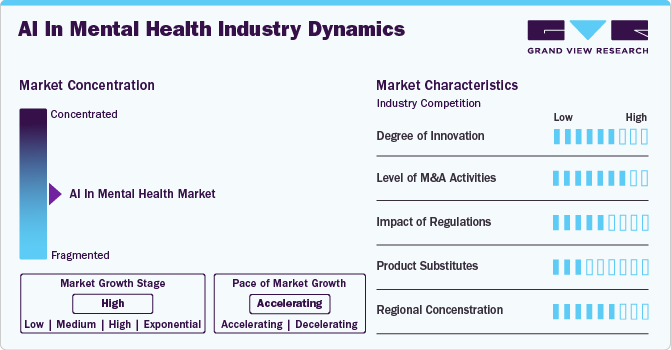
Key players are implementing various strategic initiatives, such as product launches, mergers and acquisitions to strengthen their market presence. For instance, in January 2022, Headspace Health recently announced its acquisition of Sayana, an AI-based mental health and wellness company based in San Francisco. This strategic move aims to enhance Headspace Health's capacity to offer personalized self-care solutions to its users. This acquisition follows the merger of Headspace and Ginger last year, creating Headspace Health, a company now valued at USD 3 billion. The merger combined Ginger's therapy and coaching services with Headspace's expertise in mindfulness and meditation.
Regulations play a crucial role in the AI in mental health market. Regulations, such as the European Union's General Data Protection Regulation (GDPR) impose strict guidelines on data handling, which AI startups must adhere to when developing mental health Technologies. This ensures that sensitive patient data is protected and used ethically. Moreover, the U.S. Food and Drug Administration (FDA) has established pathways for the approval of AI-based medical devices, which includes rigorous evaluation of the software's performance and reliability.
The threat of substitutes for AI in mental health is expected to be low. Traditional therapy methods serve as a primary substitute for AI-driven solutions. For example, face-to-face sessions with licensed therapists or psychologists offer personalized care through direct human interaction, fostering a therapeutic relationship crucial for many patients.
The market is propelled by significant growth and diversification across various parts of the world. North America, particularly the U.S., with robust technological infrastructure and substantial investments, has fostered the development of numerous AI-driven mental health startups. For example, companies like Woebot and Ginger use AI to provide real-time mental health support and personalized care, catering to a broad spectrum of mental health needs.
Offering Insights
Software segment accounted for the largest market share of over 75.0% in 2023 and is expected to grow at the fastest CAGR from 2024 to 2030. Increased awareness about mental health issues has led to a higher demand for mental health applications. AI-powered mental health software is increasingly being integrated into telehealth platforms, offering users easy access to mental health professionals and resources. Furthermore, the ubiquity of smartphones and internet access allows AI-driven mental health apps to reach a broad audience, including those in remote or underserved areas. For instance, in April 2024, Fortis Healthcare launched an AI-powered application to assist individuals with mental health issues. The app includes a self-assessment tool that utilizes AI to provide personalized assessments to users.
Technology Insights
The Natural Language Processing (NLP) segment held the largest revenue share of 39.5% in 2023. NLP-powered applications make mental health support more accessible and convenient. Users can interact with chatbots or virtual assistants anytime, anywhere, reducing barriers to seeking help. NLP algorithms can handle a large volume of user interactions simultaneously, making them highly scalable. This scalability allows mental health providers to reach a broader audience and deliver timely support efficiently. Furthermore, regulatory agencies are increasingly recognizing the potential benefits of AI-driven mental health solutions, including those powered by NLP technology. The establishment of regulatory guidelines and standards fosters trust and confidence in NLP-based interventions among stakeholders. Such factors are collaboratively driving the segment growth over the forecast period.
The Machine Learning (ML) segment is expected to grow at the fastest CAGR from 2024 to 2030. The rise of telehealth and digital health platforms has accelerated the integration of ML technologies, as these platforms utilize ML to enhance user experiences through personalized recommendations and automated support. For instance, apps like Woebot use natural language processing and ML to engage users in therapeutic conversations, offering real-time mental health support and interventions. Such factors are expected to derive the segment growth over the forecast period.
Disorder Insights
Anxiety disorder dominated the market in 2023. The rising incidence of anxiety disorders worldwide has led to a greater demand for accessible and effective mental health care solutions. According to the Anxiety & Depression Association of America (ADAA), October 2022 insights, anxiety disorders impact nearly one-third, specifically 31.9%, of adolescents aged between 13 and 18 years old. AI offers scalable and personalized interventions that can reach a larger population, addressing the growing need for anxiety disorder management. AI technologies are increasingly integrated into existing mental health services, such as therapy platforms, mobile apps, and virtual assistants.
By augmenting human expertise with AI-driven insights and interventions, providers can enhance the quality and efficiency of anxiety disorder treatment. Moreover, greater public awareness and focus on mental health issues have led to increased acceptance and use of digital mental health solutions, including AI-based interventions. As attitudes toward mental health evolve, individuals are more willing to seek help and engage with AI-driven tools for anxiety disorder management.
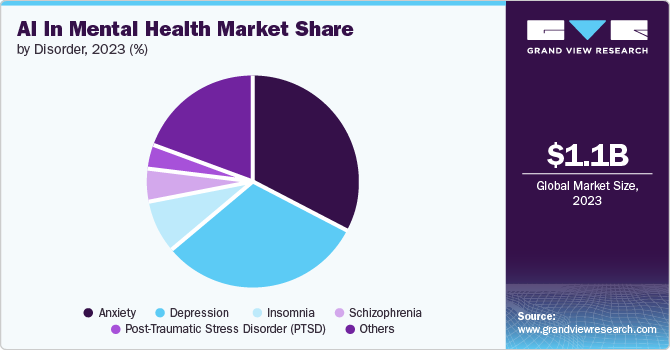
The schizophrenia disorder segment is expected to grow significantly from 2024 to 2030. AI technologies are significantly enhancing the early diagnosis and treatment of schizophrenia, a condition often challenging to detect in its initial stages. For instance, AI algorithms can analyze patterns in speech and behavior that are indicative of schizophrenia, providing early warning signs that might be missed by human clinicians. In addition, virtual reality (VR) therapies integrated with AI are being used to create immersive environments that help patients manage symptoms and practice social skills. The combination of these advancements not only improves patient outcomes but also reduces the overall cost of care, making treatment more accessible. Consequently, the incorporation of AI in managing schizophrenia is driving significant segmental growth.
Regional Insights
North America AI in mental health market accounted for the largest revenue share of 42.4% in 2023. Technological advancements and robust healthcare infrastructure support the rapid integration of AI solutions into mental health services. For instance, platforms like Talkspace and BetterHelp have leveraged AI to improve patient-therapist matching and enhance therapy outcomes. In addition, substantial investment in mental health startups and favorable government policies promoting mental health care innovation are propelling market expansion.
U.S. AI In Mental Health Market Trends
AI in mental health market in the U.S. held the largest market share in 2023. This can be attributed to the increasing prevalence of mental health disorders, which has heightened the demand for more accessible and efficient mental health care solutions. According to National Institutes of Health (NIH), it is estimated that over one in five U.S. adults, or approximately 57.8 million people, were living with a mental disorder in 2021. Furthermore, investment in mental health startups is also on the rise, reflecting confidence in the potential of AI to transform this sector. These factors collectively contribute to the robust growth of AI in the U.S. AI in mental health market.
Europe AI In Mental Health Market Trends
Europe AI in mental health market is expected to grow significantly from 2024 to 2030. This can be attributed to the support of government initiatives and increased awareness of mental health issues. For instance, a UK-based company, Ieso Digital Health, offers AI-enhanced cognitive behavioral therapy (CBT) sessions, making mental health care more accessible and effective in UK.
AI in mental health market in the UK held the largest market share in 2023. This can be attributed to the growing adoption of mental health apps, government initiatives and proliferation of AI technologies in mental health. For instance, in March 2024, U.K.'s National Health Service (NHS) introduced a chatbot named Wysa to support adults and teens dealing with anxiety, stress, and depression. This initiative also benefits those on waitlists for therapy.
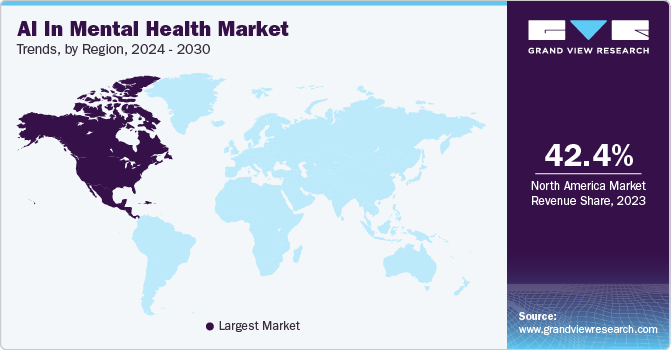
Asia Pacific AI In Mental Health Market Trends
Asia Pacific AI in mental health market, particularly in countries like China and India, the market is expanding rapidly due to the high demand for mental health services and the growing adoption of AI technologies. For instance, China's Xiaobing, an AI chatbot, provides emotional support and counseling to millions of users. In addition, India’s Wysa employs AI to offer mental health support through an app that has gained widespread acceptance.
AI in Mental Health market in Japan is expected to grow significantly from 2024 to 2030. This can be attributed to the growing aging population and the associated increase in mental health disorders such as depression and dementia. Japan's strong technological infrastructure and culture of innovation have fostered a conducive environment for the development and adoption of AI-based mental health solutions. With increasing awareness and acceptance of mental health issues in Japan, coupled with the government's initiatives to promote digital health technologies, the market for AI in mental health is poised for continued expansion in the Japanese segment.
China Al in mental health market is expected to grow from 2024 to 2030. There is a significant increase in mental health awareness and the demand for mental health services, partly due to the societal impacts of rapid urbanization and the stress associated with high-paced living. The Chinese government has been actively promoting mental health initiatives and integrating mental health care into the national healthcare system. China's robust technological infrastructure and investment in AI research and development provide a strong foundation for innovation in this sector. Companies like Ping An Good Doctor and WeDoctor are leveraging AI to offer online mental health consultations, making mental health services more accessible to a broader population.
Latin America AI In Mental Health Market Trends
The shortage of mental health professionals in many Latin American countries has created a gap in service delivery, making AI-driven teletherapy and self-help tools valuable alternatives. For example, startups like Psicobotica in Mexico are developing AI chatbots that offer mental health counseling in Spanish, catering to the region's linguistic and cultural diversity.
Key AI In Mental Health Company Insights
Notable companies are leading the way with innovative solutions and substantial market share by adopting strategies such as partnership, collaborations, mergers, and new launches. The market seems to be competitive with several startups are entering the market. For instance, companies like Lyra Health, offering employer-sponsored mental health benefits and utilizing AI for personalized treatment recommendations, are gaining traction in the corporate wellness sector. Altogether, these companies represent the dynamic landscape of AI-driven mental health solutions, collectively working towards enhancing accessibility and effectiveness in mental healthcare.
Key AI In Mental Health Companies:
The following are the leading companies in the AI in mental health market. These companies collectively hold the largest market share and dictate industry trends.
|
Companies With Dedicated Portfolio |
Companies With Diversified Portfolio |
|
|
Recent Developments
-
In April 2024, Fortis Healthcare introduced Adayu Mindfulness, an AI-powered chatbot designed to support individuals facing mental health challenges. This app provides psychological assistance similar to a first aid kit, particularly for those reluctant to seek professional help due to societal stigma.
-
In March 2023, Aiberry announced securing USD 8 million in seed funding, finance by Confluence Capital Group, Inc. (CCG), with from the VC fund Ascension AI. This new investment brings Aiberry's total funding to USD 10 million. The funds will be utilized to expedite the adoption of the Aiberry platform, which leverages an AI powered therapeutic assistant to engage in conversations, detecting mental health disorders by analyzing verbal content, subtle facial expressions, and speech patterns.
AI In Mental Health Market Report Scope
|
Report Attribute |
Details |
|
Market size value in 2024 |
USD 1.39 billion |
|
Revenue forecast in 2030 |
USD 5.08 billion |
|
Growth rate |
CAGR of 24.10% from 2024 to 2030 |
|
Actual data |
2018 - 2023 |
|
Forecast period |
2024 - 2030 |
|
Quantitative units |
Revenue in USD million/billion and CAGR from 2024 to 2030 |
|
Report coverage |
Revenue forecast, company ranking, competitive landscape, growth factors, and trends |
|
Segments covered |
Offering, technology, disorder, region |
|
Regional scope |
North America; Europe; Asia Pacific; Latin America; MEA |
|
Country scope |
U.S.; Canada; Mexico; UK; Germany; France; Italy; Spain; Sweden; Denmark; Norway; Japan; China; India; Australia; South Korea; Thailand; Brazil; Argentina; South Africa; Saudi Arabia; UAE; Kuwait. |
|
Key companies profiled |
Fortis Healthcare; Google; Microsoft; NextGen Healthcare; Wysa Ltd; Woebot Health; Spring Care, Inc.; Lyra Health, Inc.; Meru; New Life Solution, Inc. (meQ); Quartet; Syra Health; Limbic; Kintsugi Mindful Wellness, Inc; Aiberry; Ellipsis Health; SilverCloud (American Well Corporation); HEADSPACE HEALTH |
|
Customization scope |
Free report customization (equivalent up to 8 analysts working days) with purchase. Addition or alteration to country, regional & segment scope. |
|
Pricing and purchase options |
Avail customized purchase options to meet your exact research needs. Explore purchase options |
Global AI in Mental Health Market Report Segmentation
This report forecasts revenue growth at global, regional, and country levels and provides an analysis of the latest industry trends in each of the sub-segments from 2018 to 2030. For this study, Grand View Research has segmented the global AI in mental health market report based on offering, technology, disorder, and region:
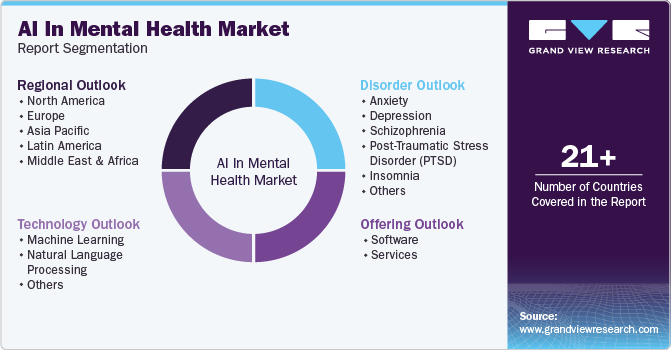
-
Offering Outlook (Revenue, USD Million, 2018 - 2030)
-
Software
-
Services
-
-
Technology Outlook (Revenue, USD Million, 2018 - 2030)
-
Machine Learning
-
Deep learning
-
Others
-
-
Natural Language Processing
-
Text Analytics
-
Speech Analytics
-
Smart Assistance
-
Others
-
-
Others
-
-
Disorder Outlook (Revenue, USD Million, 2018 - 2030)
-
Anxiety
-
Depression
-
Schizophrenia
-
Post-Traumatic Stress Disorder (PTSD)
-
Insomnia
-
Others
-
-
Regional Outlook (Revenue, USD Million, 2018 - 2030)
-
North America
-
U.S.
-
Canada
-
Mexico
-
-
Europe
-
UK
-
Germany
-
France
-
Italy
-
Spain
-
Sweden
-
Denmark
-
Norway
-
-
Asia Pacific
-
Japan
-
China
-
India
-
Australia
-
South Korea
-
Thailand
-
-
Latin America
-
Brazil
-
Argentina
-
-
MEA
-
South Africa
-
Saudi Arabia
-
UAE
-
Kuwait
-
-
Frequently Asked Questions About This Report
b. The global AI in mental health market size was estimated at USD 1.13 billion in 2023 and is expected to reach USD 1.39 billion in 2024.
b. The global AI in mental health market is expected to grow at a compound annual growth rate of 24.10% from 2024 to 2030 to reach USD 5.08 billion by 2030.
b. North America dominated the AI in mental health market with a share of 34.62% in 2023. This is attributable to the rising awareness about mental health disorders, substantial investment in mental health startups and favorable government policies promoting mental health care innovation are propelling market expansion.
b. Some key players operating in the AI in mental health market include Fortis Healthcare, Google, Microsoft, NextGen Healthcare, Wysa Ltd, Woebot Health, Spring Care, Inc., Lyra Health, Inc., Meru, New Life Solution, Inc. (meQ), Quartet, Syra Health, Limbic, Kintsugi Mindful Wellness, Inc, Aiberry, Ellipsis Health, SilverCloud (American Well Corporation), and HEADSPACE HEALTH
b. Key factors driving the market growth include increasing mental health issues, continuous advancements in AI and machine learning technologies, growing smartphone and internet penetration, and rising government initiatives to support mental health worldwide.
We are committed towards customer satisfaction, and quality service.
"The quality of research they have done for us has been excellent."




